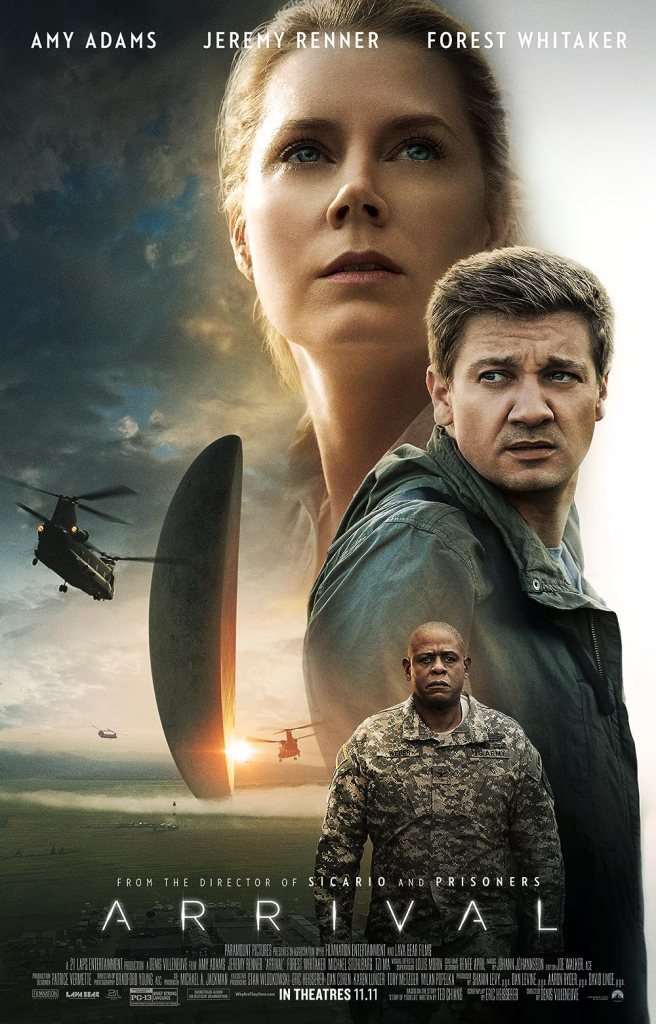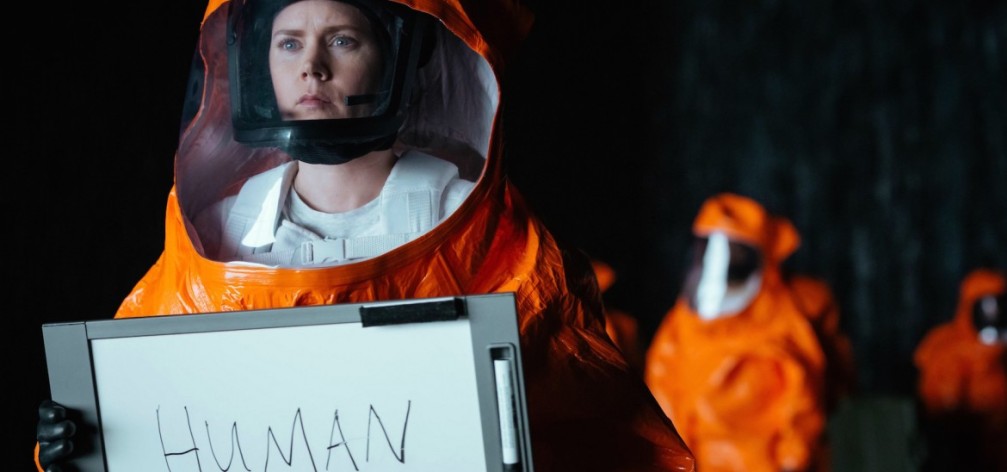If you like my work, buy me a virtual cup of coffee at Ko-Fi.
I watched Arrival (2016) starring Amy Adams and Jeremy Renner last night. I’m doing some research for a short story I’m writing and trying to talk to aliens is a big part of it.
The original novel and screenplay were written by Ted Chiang, whose name I recognized because I recently reviewed his short story anthology Exhalation. I didn’t like it very much, and I enjoyed the movie a lot better.
I should say I even recognized the name of director Denis Villeneuve and, having looked him up, realized it was from his work on Blade Runner 2049 (2017).
The movie isn’t fast paced at all, which makes sense if it’s written by Chiang. He has the sort of mind that loves solving puzzles and delving into intellectual mysteries, but not so much a lot of explosions and car (or spaceship) chases.
Big alien ships arrive at different points of the globe. Eventually, linguist Louise Banks (Adams) is teamed up with physicist Ian Donnelly (Renner) to go to the Montana site and attempt contact with them. Forest Whitaker plays their military liaison Colonel Weber who is trying to give them every type of help, but he’s responsible for reporting to our military industrial complex, so his hands are sort of tied.
Banks gets the jump on linguists at the other global sites by introducing written language since she doesn’t have a hope of replicating their vocalizations. As information slowly becomes clearer, it seems as if the aliens want to pit the different nations against each other. The idea is that one world leader is easier to deal with than a whole bunch of them.
That results in China’s General Shang (Tzi Ma) shutting down communications with the rest of the teams and delivering an ultimatum to the aliens: leave our territory or go to war.
Louise thinks there’s a different interpretation. Part of that is based on her dreams and visions of her daughter Hannah. Forming a close bond with Ian, the two explore the alien language and thought, but ultimately, it’s Louise who has to go it alone.
In part this is due to a rogue group in the military who planted a bomb on the alien ship. The aliens save Louise and Ian just in time but at the loss of one of their own. The ship rises half-a-mile overhead but doesn’t leave.
With all the other nations having broken off contact, and with China and several other countries on the verge of war, Louise is desperate to resolve the conflict. The aliens send a “shuttle” for her and in her last contact with them, she learns everything else.
The aliens do not experience time as linear and as Louise has immersed herself in their language, her thoughts and dreams have also become “unstuck” in time. She remembers the future and from that, knows what she has to do in the present by contacting Shang on his private number and saying something to him she learned only from a future memory.
Once Shang de-escalates, so does the rest of the world, and what Louise learned ultimately brings humanity closer to unification.
She had been remembering her future marriage to Ian, the daughter they had together, and her tragic terminal illness that will take her life at age twelve.
Somehow, that’s all worth it though, and although “we win,” there’s a tragic undertone to not only the ending but the entire movie.

Hannah was played at age six by Jadyn Malone, at age eight by Abigail Pniowsky, and at age twelve by Julia Scarlett Dan
It’s not exactly satisfying for that reason, but it forms a complete story that describes the fabric of life, the happy threads among the sad.
I’m sure real linguists would watch this movie and point out all the mistakes, but I don’t have that expertise. I was okay with the one hour, fifty-six minute experience, but couldn’t have taken much more of “I love you Hannah but you’re going to die.”



Arrival is one of my all-time favorite films, despite its slow thoughtful pace. To me its depicted linguistic approach is quite enlightening, though it was never clear how the protagonist was able to interact with the aliens to produce their symbols on the interface wall itself rather than on the computer screens used to replicate most of the shared vocabulary that was decoded. Also missing was the apparent telepathic interaction in their final encounter that finally explained why the aliens had come to earth. Also not explained but merely inferred was why 12 ships scattered themselves randomly around the planet, each supplying only a portion of the information they had come to impart to enable humans to develop the ability to think timelessly for the sake of their future assistance.
LikeLike
It’s possible Chiang’s novel filled in those gaps, but I agree, there were some “leaps” taken in the film.
LikeLike